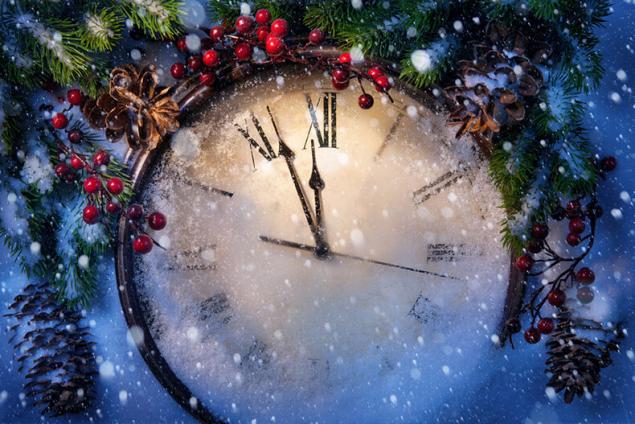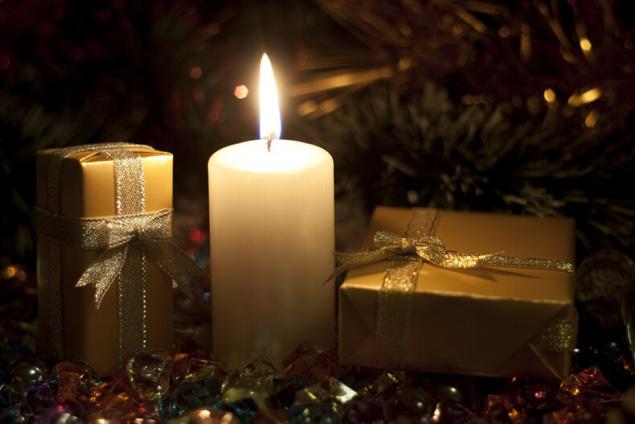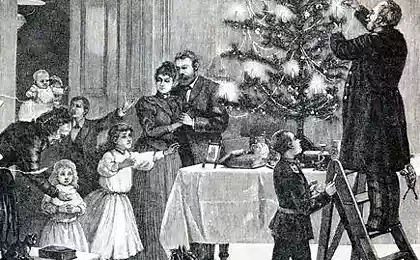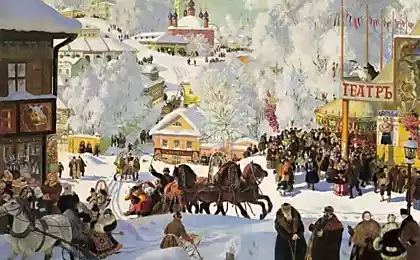550
In the night from 13 to 14 January Old New year 2017: customs and traditions
The tradition to celebrate old New year among the Slavs originated in 1918, when Soviet Russia was forced to go to life according to the Gregorian calendar, to resolve a frightening time difference between Europe and Russia.
Subsequently, the Julian calendar was abolished, but the Orthodox Church did not obey the orders of the Soviet authorities and continued to celebrate the holiday in the old regime, but now on January 14. That is, the old New year is a New year, which people continue to celebrate in the old style.

Signs and traditions in Vasiliev evening
With the night from 13 to 14 January, the people again celebrated the arrival of the New year, the eve of which was called Vasiliev evening, in honor of the patron Saint of pigs – Holy Basil. This day is usually slaughtered pig meat which was prepared by a countless number of hearty dishes, as it is a pig the ancestors acted as a symbol of fertility, cattle and family welfare. In addition to the above named, this day is popularly called as "Generous evening" or "Ovsen'".
How did you prepare for the holiday?
The morning hostess treated the entire family of wheat porridge which is generously filled with meat or honey. The people went the sign: the tastier the porridge, the better will be the coming year. But if the dish failed, and the family will pursue failure. Then from lunch to evening women baked pancakes, cooked varenyky with different fillings and baked piglets. The men helped them with the housework and the children went caroling.
The ritual of "osinkina" was accompanied by dressing up in costumes and walking from house to house with songs that were supposed to bring the village good luck and prosperity. The owners, who are allowed to your doorstep to sing carols, be sure everyone was treated to something delicious. The evening was covered by a generous table, to appease the coming year, and at night the whole family went to visit neighbors to bring about peace and grace.
On the morning of January 14 young people took to the streets and lit fires to burn the "Didukh" and jump over the new year's fire as a sign of purification. That night believed: the more stars in the sky, the more you will bear the crop.

Mandatory the dishes on the table to meet old New year
To a festive table consistent with the canons of the old Slavonic traditions, it is important in the celebration of old New year bring to the table Christmas pudding, which is prepared from buckwheat and barley (currently used rice) with the addition of a variety of dried fruits, nuts, grapes and honey. The richer the stuffing, the better. The fact is that every product carries a sacral meaning: symbolize health nuts, raisins – the longevity, the grain – the beginning of a new life, honey – good news, Mak – wealth.
By the way, our ancestors, with special attention to the rites associated with the prediction of destiny. The main tradition in every family was eating special dumplings with surprise. Their filling was hiding a variety of items, from Bay leaf to the coin. Got the dumpling with cherries? To temptation. With cabbage? To money. Ring talked about the forthcoming wedding, thread warned about a long journey, button – wear it, pepper and salt to grief.

Popular divination in the old New year
Not only the festivities for the holiday table did the peasants. Everything from small to large, with special reverence waited for nightfall, to practice divination. People believed that on the night of 13 to 14 is the magic, in this period, down to earth dark and light forces which have knowledge.
"Turning the ear"
If you want to know what kind of year lies ahead, then you just need to hear someone else's conversation. Ask the question and listen what people say around: laughing – everything will be fine, cry or swear – that means that you will have a difficult, and if you drink – stay away from temptations.
"Prophetic line"
In the old days girls especially loved to read books. They prepared the questions and then called the number of page and line. Response and served as a prophecy.
The "Green sprout"
To see who first gets married, unmarried women selected for the bulb and put the spine in the water. Who had previously set off the sprout, and that will be the first married.
"The Stranger"
To learn the name of a boyfriend, single girls not infrequently just after midnight ran out of the house to look for the first counter male. There was a belief that what the name call a stranger, this is going to be a future husband.
Paisios of the Holy mountain: God hurts for the grief that people experience
The oath of allegiance: I'm with you
"Surprise Bag"
In the house were preparing a bag with a variety of small objects – pebbles cereals, handkerchiefs. There was hiding a crust of bread, a ring and a hook. Without looking inside, you had to get out of the bag first thing. If a girl pulled the bread – to live in wealth, trigger, trouble, or hard luck, and a ring – to a happy marriage.published
Source: ysia.ru/obshhestvo/staryj-novyj-god-2017-obychai-traditsii-gadaniya/
Subsequently, the Julian calendar was abolished, but the Orthodox Church did not obey the orders of the Soviet authorities and continued to celebrate the holiday in the old regime, but now on January 14. That is, the old New year is a New year, which people continue to celebrate in the old style.

Signs and traditions in Vasiliev evening
With the night from 13 to 14 January, the people again celebrated the arrival of the New year, the eve of which was called Vasiliev evening, in honor of the patron Saint of pigs – Holy Basil. This day is usually slaughtered pig meat which was prepared by a countless number of hearty dishes, as it is a pig the ancestors acted as a symbol of fertility, cattle and family welfare. In addition to the above named, this day is popularly called as "Generous evening" or "Ovsen'".
How did you prepare for the holiday?
The morning hostess treated the entire family of wheat porridge which is generously filled with meat or honey. The people went the sign: the tastier the porridge, the better will be the coming year. But if the dish failed, and the family will pursue failure. Then from lunch to evening women baked pancakes, cooked varenyky with different fillings and baked piglets. The men helped them with the housework and the children went caroling.
The ritual of "osinkina" was accompanied by dressing up in costumes and walking from house to house with songs that were supposed to bring the village good luck and prosperity. The owners, who are allowed to your doorstep to sing carols, be sure everyone was treated to something delicious. The evening was covered by a generous table, to appease the coming year, and at night the whole family went to visit neighbors to bring about peace and grace.
On the morning of January 14 young people took to the streets and lit fires to burn the "Didukh" and jump over the new year's fire as a sign of purification. That night believed: the more stars in the sky, the more you will bear the crop.

Mandatory the dishes on the table to meet old New year
To a festive table consistent with the canons of the old Slavonic traditions, it is important in the celebration of old New year bring to the table Christmas pudding, which is prepared from buckwheat and barley (currently used rice) with the addition of a variety of dried fruits, nuts, grapes and honey. The richer the stuffing, the better. The fact is that every product carries a sacral meaning: symbolize health nuts, raisins – the longevity, the grain – the beginning of a new life, honey – good news, Mak – wealth.
By the way, our ancestors, with special attention to the rites associated with the prediction of destiny. The main tradition in every family was eating special dumplings with surprise. Their filling was hiding a variety of items, from Bay leaf to the coin. Got the dumpling with cherries? To temptation. With cabbage? To money. Ring talked about the forthcoming wedding, thread warned about a long journey, button – wear it, pepper and salt to grief.

Popular divination in the old New year
Not only the festivities for the holiday table did the peasants. Everything from small to large, with special reverence waited for nightfall, to practice divination. People believed that on the night of 13 to 14 is the magic, in this period, down to earth dark and light forces which have knowledge.
"Turning the ear"
If you want to know what kind of year lies ahead, then you just need to hear someone else's conversation. Ask the question and listen what people say around: laughing – everything will be fine, cry or swear – that means that you will have a difficult, and if you drink – stay away from temptations.
"Prophetic line"
In the old days girls especially loved to read books. They prepared the questions and then called the number of page and line. Response and served as a prophecy.
The "Green sprout"
To see who first gets married, unmarried women selected for the bulb and put the spine in the water. Who had previously set off the sprout, and that will be the first married.
"The Stranger"
To learn the name of a boyfriend, single girls not infrequently just after midnight ran out of the house to look for the first counter male. There was a belief that what the name call a stranger, this is going to be a future husband.
Paisios of the Holy mountain: God hurts for the grief that people experience
The oath of allegiance: I'm with you
"Surprise Bag"
In the house were preparing a bag with a variety of small objects – pebbles cereals, handkerchiefs. There was hiding a crust of bread, a ring and a hook. Without looking inside, you had to get out of the bag first thing. If a girl pulled the bread – to live in wealth, trigger, trouble, or hard luck, and a ring – to a happy marriage.published
Source: ysia.ru/obshhestvo/staryj-novyj-god-2017-obychai-traditsii-gadaniya/























